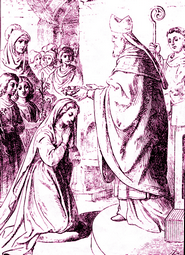Lives of the Saints
Our Models and Protectors
Spiritual Bouquet:
June 8

Saint Medard
Bishop of Noyon and Tournai
(† 545)
Saint Medard, one of the most illustrious prelates of the Church of France in the late fifth and the sixth century, was born in Picardy of a pious and noble family in about the year 457, in the time of Childeric and Saint Remigius. His brother, Saint Gildard, would later become Archbishop of Rouen; Saint Owen and other authors say they were twins.
From his childhood Saint Medard manifested the most tender compassion for the poor. On one occasion he gave a fine new cloak to a destitute blind man, and when asked why he had done so, he answered that the misery of a fellow member in Christ so affected him that he could not refuse to give him part of his own clothes. He gave one of his father's horses to a poor man who had just lost his only horse by an accident; but when his father counted his animals that evening, he found the number unaltered. This miracle caused the parents to allow their son to bestow alms as he wished. As a young man he prophesied to a companion and friend, the future Saint Eleutherius, that he would later be raised to the government of the see of Tournai.
Saint Medard and his brother Gildard were ordained by the bishop of Vermand while still relatively young; after being tonsured together they pursued the same ecclesiastical studies under the bishops of Tournai and Vermand. The annals tell us that, to assist Saint Remigius, the two brothers were present in the cathedral of Rheims, for the baptism of Clovis and his large army of Franks in 496. Saint Gildard was named to the archbishopric of Rouen towards the end of the century, where according to its archives, he provided in all things for the needs of his people until he died in 545.
Saint Medard after acceding to the priesthood became a bright ornament of that sacred Order. He preached the word of God in the churches of Picardy, with an unction which touched the hearts of the most hardened; and the powerful influence of his example and his unfailing charity, by which he enforced the precepts which he delivered from the pulpit, was resisted by few. Some incidents were recorded concerning this holy priest. Several thieves had taken from his terrain various items, such as a harvest of grapes or a fund of honey, even a bull. The stealer of honey was pursued by the bees until he came to confess his larceny at the priest's feet and ask pardon; the bull thief had to bring the animal back because the bell around its neck never stopped ringing. And finally, the bishop bestowed upon the repentant ones the goods they had taken without permission.
In the year 530, the thirteenth bishop of Vermand died, and Saint Medard was unanimously chosen to fill the vacancy. He was consecrated by Saint Remigius, bishop of Rheims. The new bishop found it necessary to transfer the seat of his episcopacy, because the region of Vermand had been recently devastated during the invasions of the Huns and Vandals. Profanation was threatening; thus he moved his center to Noyon. Pope Hormisdas named him also to the episcopal throne of Tournai, uniting the two dioceses without depriving either city of its episcopal title.
At Tournai, where the barbarians were numerous, he was treated with opprobrium and often threatened with death; he nonetheless overcame the rudeness of the infidels and libertines and brought about so many conversions that the diocese was entirely altered in appearance. Our Saint's new dignity did not make him abate anything of his austerities, and, though at that time he was advanced in age, he thought himself obliged to redouble his penitential labors. Despite the vast extent of his diocese, it seemed insufficient for his zeal, which could not be confined. Wherever he saw the opportunity of advancing the honor of God and abolishing the remains of idolatry, he overcame all obstacles, and by his zealous labors and miracles the rays of the Gospel dispelled the mists of idolatry everywhere.
After Saint Medard had completed his great work in Flanders, he returned to Noyon, where shortly afterwards he fell ill. Before he died, King Clotaire, son of Clovis, whom he had brought to penance, prevailed upon him to accept being buried in a magnificent basilica, which he intended to build to serve as his sepulcher. In 545 the entire kingdom lamented his death, as his brother Saint Gildard was mourned in the same year in the region of Rouen. In the two bishops the faithful had lost their common fathers and protectors.
Reflection. The Church takes delight in styling her founder Jesus most amiable", and He indeed says of Himself, I am meek and humble of heart. His true followers can all be characterized in the same way.
Les Petits Bollandistes: Vies des Saints, by Msgr. Paul Guérin (Bloud et Barral: Paris, 1882), Vol. 6; Little Pictorial Lives of the Saints, a compilation based on Butler's Lives of the Saints, and other sources by John Gilmary Shea (Benziger Brothers: New York, 1894).